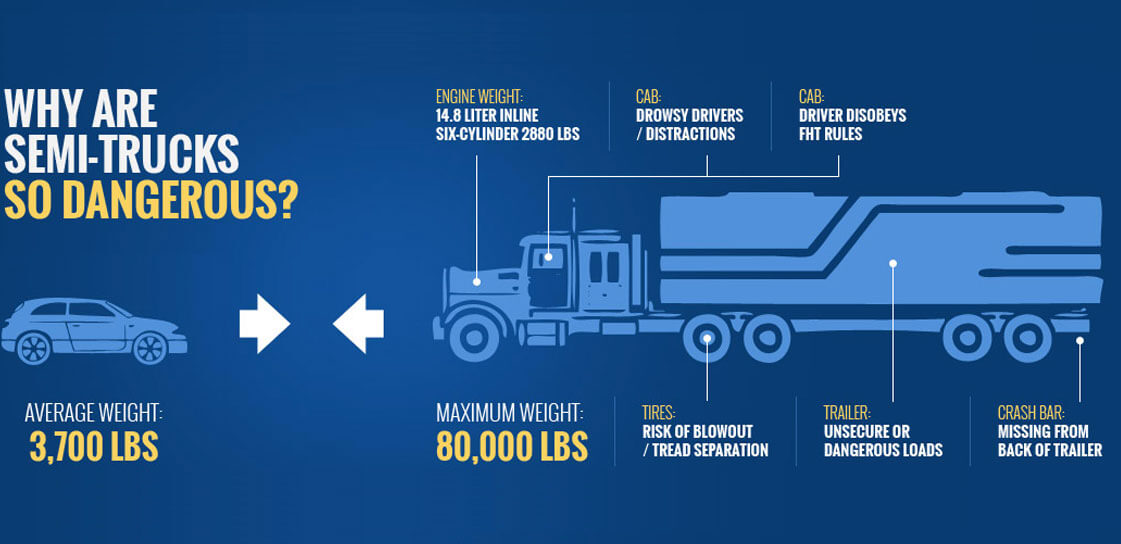Both Federal and State laws regulate trucking companies and semi-drivers. The Federal Motor Carrier Safety Administration (FMCSA) regulates drivers of commercial motor vehicles and applies to all vehicles with a Gross Vehicle Weight Rating in excess of 10,000 pounds.
The FMCSA monitors vehicle drivers’ licenses as well as the safety of the drivers’ practices. Interstate trucking on public roads is overseen by the Department of Transportation (DOT). State regulations govern purely intrastate activity.
Carrier Regulations
The carrier is the company behind the trucks and their operators. Before a carrier even puts one truck on the road, our Albuquerque personal injury attorney says, it must agree to adhere to the Federal Motor Carrier Safety Regulations (FMCSR). Furthermore, interstate motor carriers (those carriers whose trucks travel across state lines) must register with the United State Department of Transportation to comply with the following:
- Regulations of the Secretary of Transportation and Surface Transportation Board
- Any safety regulations, duties of carriers and employees, and safety fitness requirements imposed by the Secretary, and
- The minimum financial responsibility requirements
Carriers that operate only within one state must comply with state regulations, which are often very similar to federal regulations.
A carrier must register with the FMCSA which grants operating authority to the carrier and receive a USDOT number that must be displayed on each commercial motor vehicle to identify the carrier name. The USDOT number identifies who owns the vehicle and assist with monitoring the carrier’s safety data from crash investigations, inspections, audits, and compliance reviews.
The FMCSR states that the motor carrier has a clear, nondelegable duty to monitor, control, and supervise the conduct of every driver and employee, including independent contractors. This duty includes:
- Documentation and preservation of records
- Hiring
- Supervision and retention
- Training
- Maintenance
- Financial responsibility
- Weight and size restrictions
- Post-accident truck driver testing
 |
 |
Driver Regulations
Not just anyone can drive a semi-truck. Truck drivers must meet certain basic qualifications and comply with federal regulations before they can ever get behind the wheel. Federal regulations require truck drivers to obtain a commercial driver’s license or CDL. The New Mexico DMV website has information on New Mexico CDL testing requirements and has the Commercial Driver’s License Manual available for download.
After a driver has obtained their CDL and starts driving, there are many other regulations that they must then follow:
1. Documentation
A driver is required to produce a “Driver Vehicle Examination Report” at the end of each work day. A driver must also properly document his hours of service.
2. Inspections
Before beginning on his route, a driver is required by federal regulation to check and be satisfied that equipment and parts are in good working order.
3. Basic Operation
A driver must report any and all traffic violations to his employer.
4. Cargo Securement
A driver is responsible for ensuring that he is not transporting an overload, which can be very dangerous and may result in serious accidents.
5. Fatigue and Truck Driver Hours of Service Rules
One of the most controversial issues for truck drivers and those traveling on the road around them is driver fatigue. A new regulation took effect in July of 2013 mandating that the truck hours of service must not exceed 11 hours after the trucker has spent 10 consecutive hours off duty.
6. Texting and Driving
The FMCSA prohibits texting and driving. This law applies to both truck drivers and bus drivers carrying a CDL.
The FMSCA Regulations are exhaustive and can be difficult to understand. If a truck driver and/or their company failed to comply with one or more of these regulations and the violation contributed to your injuries, an experienced attorney may be able to use the violations as a basis for your lawsuit. Hiring a Albuquerque truck accident lawyer with experience in handling truck accidents and knowledge of trucking regulations is key to the successful outcome of your case.

